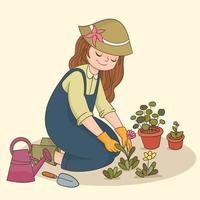Unlock the Secrets of Successful Gardening for Beginners with These Necessary Idea
Wiki Article
The Ultimate Guide to Horticulture for Beginners: Step-by-Step Tips and Techniques for Expanding a Thriving Garden
Are you prepared to dive into the globe of gardening? Look no additionally than "The Ultimate Guide to Gardening for Beginners." This detailed guide will certainly walk you via every little thing you need to recognize to grow a thriving yard. From comprehending your yard space to picking the right plants and preparing the soil, we have actually got you covered. Prepare yourself to release your green thumb and create a gorgeous, flourishing yard.Understanding Your Garden Space
Understanding your yard area is crucial for developing a thriving yard. This will help you establish which plants will grow in each area. gardening tips for beginners.Next, assess the dirt in your yard. Comprehending your soil kind will certainly assist you in selecting the right plants and carrying out ideal dirt changes. This details will certainly aid you make notified decisions concerning watering and plant placement.
In addition, focus on any type of microclimates within your garden. These are small locations that may vary in temperature or dampness levels compared to the remainder of your garden. A south-facing wall surface might keep warmth, creating a warmer microclimate. Use these variations to your benefit by planting moisture-loving or heat-loving plants in these locations.
Choosing the Right Plants
:max_bytes(150000):strip_icc()/close-up-of-a-women-watering-vegetables-in-a-raised-bed-1407277094-c63fd1ff0a21406ebf17c51ac6c6f2d1.jpg)
Next, consider your gardening objectives and choices. Are you seeking to grow vegetables, flowers, or a mix of both? Do you choose low-maintenance plants or are you ready to place in added effort for high-yield crops? Consider the amount of time, power, and resources you want to purchase your garden.
In addition, take into consideration the room available in your garden. Take measurements and plan the design of your plants. Take into consideration the fully grown dimension of each plant and make certain they have adequate area to expand without congestion each other.
Ultimately, consider the functionality of your plant choices. gardening tips for beginners. Will you have the ability to supply the needed treatment and maintenance for your selected plants? Think about elements such as watering, fertilizing, pest control, and pruning
Preparing the Soil for Growing
As soon as you have actually chosen the best plants for your prospering yard, it's time to dive right into the important task of preparing the dirt for growing. Take a sample and test its pH levels, as various plants prosper in different pH varieties.
As soon as the soil is prepared, create furrows or holes for growing. The deepness and spacing will depend on the particular requirements of your chosen plants, so refer to the seed packets or plant tags for assistance.
Lastly, water the newly grown area completely. This will help settle the dirt and offer the plants with the wetness they require to establish themselves. As you water, be mindful not to clean away the soil or damages the fragile plants. With appropriate soil prep work, your yard will be well-equipped to sustain the development and success of your plants.
Watering and Feeding Methods
After preparing the soil for growing, it's vital to understand effective watering and feeding methods to ensure the wellness and growth of your yard. When it pertains to watering, it's essential to strike an equilibrium. Overwatering can result gardening tips for beginners in root rot and other conditions, while underwatering can result in stunted development and wilting. The trick is to provide sufficient water to maintain the soil constantly wet however not filled. One way to determine if your plants require watering is by sticking your finger regarding an inch into the dirt. It's time to water if it really feels dry. When watering, purpose for the base of the plants, as wetting the leaves can motivate illness. When it comes to feeding, it's essential to give your plants the nutrients they require to thrive. Organic fertilizers, such as compost or well-rotted manure, are exceptional selections as they give a slow release of nutrients. It's best to apply fertilizers in early spring or late autumn, adhering to the instructions on the bundle. Remember to sprinkle your plants after fertilizing to help the nutrients reach the roots. By mastering these watering and feeding methods, you'll be well on your way to a successful garden.Keeping a Healthy And Balanced Yard
To keep a healthy yard, you ought to regularly examine your plants for indicators of insects or illness. By doing this, you can capture any type of problems early on and take the needed actions to prevent them from creating and spreading out damage to your entire yard.One way to fight pests is by utilizing all-natural remedies such as insecticidal soaps or neem oil. These work in managing usual insects like aphids, mites, and whiteflies without damaging useful bugs. One more method is to motivate advantageous bugs like ladybugs and lacewings, which eat yard pests. Planting flowers such as sissies, sunflowers, and marigolds will certainly attract these useful bugs to your yard.
In addition to pests, diseases can additionally influence your plants. Correct spacing in between plants and excellent air flow can likewise help prevent the spread of conditions.
Verdict
In verdict, horticulture can be a fulfilling and meeting pastime for novices. By comprehending your garden space, selecting the right plants, preparing the soil, and executing proper watering and fertilizing techniques, you can develop a successful yard. Remember to keep its health by frequently often tending to it. With persistence and commitment, you'll soon be delighting in the charm and bounty of your very own flourishing garden. Satisfied horticulture!Utilize these variations to your benefit by planting moisture-loving or heat-loving plants in these areas.

Report this wiki page